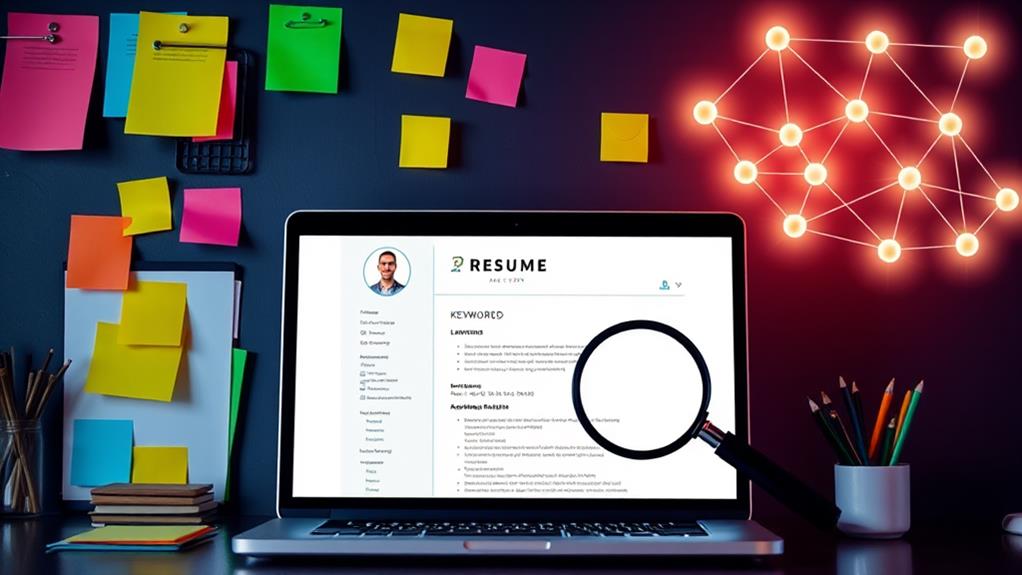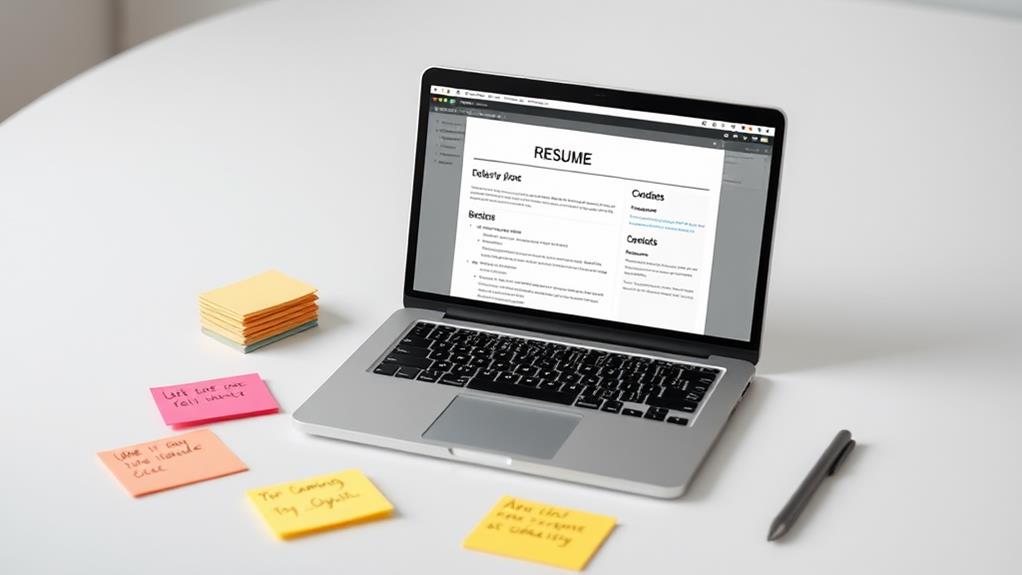To write a strong resume for remote jobs, start by clearly labeling remote roles and emphasizing your adaptability and communication skills. Tailor your resume for each application by including relevant keywords from job postings, such as "virtual" or "telecommute." Highlight your proficiency in remote collaboration tools, like Zoom and Slack, and make sure to quantify your accomplishments, showing how you've positively impacted previous teams. Keep your layout clean with clear headings and bullet points, making it easy to read. Remember, showcasing your unique remote experiences can set you apart, and more useful tips are just ahead.
Remote Job Resume Essentials

When crafting a resume for remote jobs, clarity is key. You want to make it easy for hiring managers to quickly understand your qualifications. Start by clearly labeling remote positions on your resume with terms like "Remote," "Telecommute," or "Virtual." This helps to immediately convey your experience working in a remote setting.
Highlighting relevant skills is crucial, especially since various roles offer competitive pay rates that can be appealing to potential employers.
Next, include a dedicated skills section that showcases both hard and soft skills relevant to remote work. Highlight your proficiency in remote collaboration tools like Slack and Zoom, and emphasize strong time management abilities. Quantify your accomplishments, such as stating, "Increased team productivity by 30% through effective virtual collaboration." This gives concrete evidence of your impact.
Remember to tailor your resume for each remote job application. Use keywords from the job description to enhance your visibility in applicant tracking systems (ATS).
Lastly, maintain a clean and professional layout with clear headings and bullet points, making it easy for hiring managers to navigate your remote work resume. Following these essentials will help you present yourself as a strong candidate ready for remote opportunities.
Emphasize Adaptability and Communication Skills
Adaptability and communication skills are vital for success in remote work environments, with 70% of companies seeking employees who can adjust to changing circumstances.
To find genuine remote opportunities, it's essential to emphasize these skills on your professional resume. Start by showcasing your adaptability. Highlight experiences where you successfully navigated remote challenges or adapted to changes in project scope. This demonstrates your ability to thrive in dynamic settings.
Additionally, utilizing verified job boards like FlexJobs and Remote.co can help you discover legitimate remote positions that match your skill set.
Next, focus on your communication skills. Effective communication is crucial in remote roles, as it can enhance team performance by up to 25%.
Mention specific tools you've used, like Slack or Zoom, to show your familiarity with digital communication platforms. You might also include examples of successful virtual presentations or team meetings that illustrate your proficiency.
Tailor Resumes for Remote Roles

To stand out in the competitive landscape of remote job applications, tailoring your resume is essential. Start by clearly indicating your preference for remote work in the contact section and throughout your resume. Use terms like "Remote" or "Location Independent" to catch hiring managers' attention.
Next, focus on your professional summary. Customize it to include specific remote work experience and skills that match the job description. This makes your resume more relevant.
Don't forget to incorporate keywords related to remote work from the job posting to enhance your chances with Applicant Tracking Systems (ATS).
In the work experience section, highlight any previous remote positions explicitly by labeling them as "Remote." This clarity helps hiring managers quickly see your remote work experience.
Additionally, quantify your achievements from remote collaborations. For example, you could say, "Successfully managed a virtual team project that resulted in a 30% increase in efficiency."
These strategies not only showcase your skills but also demonstrate your impact in remote roles. Tailoring your resume this way will make you a strong candidate for remote opportunities.
Free Downloadable Resume Templates
A variety of free downloadable resume templates designed specifically for remote jobs can significantly boost your chances of landing the position you want. These templates help your application stand out by incorporating relevant keywords and formats that appeal to Applicant Tracking Systems (ATS).
Many websites offer customizable options, allowing you to tailor your resume for specific remote job applications. You can effectively highlight your remote work experience and the skills that make you a great fit for remote positions.
Utilizing professionally designed templates saves time and enhances the visual appeal of your resume, which is key for making a positive impression on hiring managers. Look for templates that include sections focusing on your remote work accomplishments and expertise in remote collaboration tools.
This makes it easier to showcase your adaptability. By downloading templates that emphasize remote job preferences, you communicate your intent clearly from the start, boosting your visibility to potential employers.
In this competitive job landscape, taking advantage of these resources can set you apart. So dive in, choose a template that resonates with you, and get ready to present your best self in the world of remote work!
Remote Job Market Competitiveness

Navigating the remote job market can feel overwhelming, especially with its heightened competitiveness. Post-pandemic, remote work offerings have surged by 70%, attracting a global pool of applicants and making job listings more crowded than ever.
When applying for a remote position, you should know that about 25% of these postings receive over 100 applications, emphasizing the fierce competition.
To stand out, remember that remote jobs require specific skills that align with what employers seek. Candidates with prior remote work experience are 2.5 times more likely to be hired, so if you have it, highlight that on your resume.
Focus on showcasing skills required for the job, particularly in sought-after sectors like tech and marketing, where over half of job seekers prioritize remote opportunities.
Keep in mind that filling remote positions takes 30% longer than traditional roles, as companies carefully vet candidates to find the right fit. This means you need to be patient but persistent.
Showcase Remote Adaptability Skills
Demonstrating your remote adaptability skills is crucial in today's job market, as employers seek candidates who can thrive in dynamic environments.
Start by highlighting your remote work experience, especially those moments when you completed projects under tight deadlines. This shows your ability to adapt and manage your time effectively.
Make sure to include specific examples of how you prioritized tasks while working remotely. Employers love to see solid time management skills since they're essential for maintaining productivity.
Don't forget to mention your familiarity with collaboration tools like Slack, Zoom, and Asana. These remote skills demonstrate your capability to communicate and work well with team members from various locations.
If you've managed or contributed to projects across different time zones, emphasize that experience. It showcases your flexibility and ability to coordinate with diverse teams.
Increased Job Application Visibility

Highlighting your remote adaptability skills is an excellent way to show your qualifications, but you also need to focus on making your resume visible to potential employers. To stand out, include keywords related to remote work in your resume. Use terms like "remote," "telecommute," and specific tools mentioned in job descriptions. This can significantly enhance your visibility in applicant tracking systems (ATS), which many companies use to filter job applications.
Tailor your resume for each job application by incorporating relevant skills and phrases from the job listing. This not only shows that you're a good match, but it also increases your chances of being noticed by hiring managers. Make sure to highlight your remote work experience prominently in the summary and experience sections so recruiters can quickly recognize your qualifications.
Additionally, using an ATS-friendly resume format is crucial. This ensures your application is properly parsed and reviewed easily by hiring personnel.
Lastly, include a clear statement of your interest in remote work in your contact section. This simple addition can make your application stand out in a competitive job market, showcasing your commitment to remote opportunities.
Highlight Remote Collaboration Tools
Effective communication and collaboration are crucial in remote work settings, and showcasing your proficiency with remote collaboration tools can set you apart from other candidates. Start by listing the specific tools you know, like Slack for messaging, Zoom for video conferencing, and Microsoft Teams for team coordination. Emphasizing your experience with these tools shows you understand the dynamics of remote work.
Don't forget to mention project management tools such as Asana or Trello. Highlight how you've used these platforms to streamline tasks and track progress. This demonstrates your ability to enhance productivity within remote teams.
Additionally, being well-versed in video conferencing software is key. Share examples of how you've effectively conducted meetings that engaged team members across different locations.
Lastly, highlight your knowledge of cloud storage solutions like Google Drive or Dropbox. Explain how you've utilized these tools to ensure secure and efficient file access for your team.
Identify Key Remote Job Skills

Identifying key remote job skills can significantly enhance your resume and make you a more attractive candidate.
First and foremost, effective digital communication is crucial; it accounts for about 70% of remote job requirements. You'll need to clearly express your ideas and collaborate with virtual teams.
Time management is another vital skill. Remote workers often juggle multiple tasks, so being able to prioritize effectively ensures you meet deadlines without direct supervision.
Adaptability is essential too. Familiarizing yourself with various remote tools, like Asana for project management or Slack for communication, can make a big difference in your workflow. Being flexible in using different technologies shows you're ready for any challenge.
Moreover, problem-solving skills are highly valued in remote roles. You'll often need to troubleshoot issues independently and develop creative solutions without immediate support.
Lastly, while self-motivation might be discussed later, it's still worth noting that it plays a huge role in remote work success. When you manage your own schedule, studies show you can boost your productivity significantly.
Highlighting these remote job skills on your resume will help you stand out and land that coveted position.
Emphasize Self-Motivation and Discipline
To thrive in a remote work environment, you must demonstrate self-motivation and discipline, essential traits that set successful candidates apart. Employers look for individuals who can manage their time effectively without direct supervision. Make sure to highlight your remote work experience, showcasing your ability to work independently and stay productive.
When crafting your resume, emphasize your discipline by including specific examples of projects where you met deadlines and produced high-quality work autonomously. This not only showcases your self-discipline but also signals to employers that you can stay focused, an invaluable trait in remote roles.
Remember, a survey found that 70% of remote workers believe self-management skills are crucial for productivity.
Additionally, effective time management is a key aspect of self-motivation. Quantify your achievements, like completing tasks ahead of schedule or managing multiple projects simultaneously, to illustrate your capabilities. This not only enhances your resume but also gives potential employers a clear picture of your work ethic.
Remote Job Resume Action Plan

Building on the importance of self-motivation and discipline, having a solid action plan for your remote job resume is vital for standing out in a competitive market.
To create an effective remote resume, follow these key steps:
- Clarify your goals: Make it clear in your contact information section and professional summary that you want to work remotely, so hiring managers know your intentions right away.
- Tailor your content: Customize your resume for each remote position by using keywords from the job description. Highlight your specific skills and experience that match what the employer seeks.
- Showcase remote experience: If you have previous remote work experience, label your job titles with "Remote." Include quantifiable achievements to demonstrate your success in those roles.
- Utilize an ATS-friendly template: To ensure your remote resume is easily read by applicant tracking systems, use a clear format that enables easy navigation for hiring managers.
Outline Your Remote Job Goals
When outlining your remote job goals, it's essential to communicate your intentions clearly right from the start. Begin by including a resume summary that highlights your desire for remote work. This way, hiring managers recognize your goals immediately.
Tailor your resume to reflect specific remote job goals by using keywords from job descriptions that focus on remote work skills.
Don't forget to showcase your past remote work experiences. Highlight projects that demonstrate your adaptability in virtual environments.
It's also crucial to emphasize key skills necessary for remote jobs, such as self-motivation and time management. These traits show employers you can manage your workload effectively, even from home.
If you're skilled with remote collaboration tools, mention this too. It aligns with what employers expect in a remote worker.
Additionally, consider adding your preferred working hours or time zone to clarify your availability. This small detail can enhance your candidacy and show you're serious about remote opportunities.
Use Clear, Concise Language

Using clear, concise language is vital for making your resume stand out to hiring managers. When applying for remote jobs, it's essential to present your skills and achievements in a way that's easy to digest. Here are some tips to ensure your resume shines:
- Use Simple Language: Avoid jargon or complex terms that might confuse hiring managers. Stick to straightforward words that clearly convey your message.
- Focus on Action Verbs: Start bullet points with strong verbs like "developed," "managed," or "improved." This makes your work experience more dynamic and impactful.
- Keep It Brief: Limit each bullet point to one or two lines. This helps hiring managers scan your resume quickly while still capturing your key accomplishments.
- Tailor Your Language: Align your resume with the job description by using relevant keywords. This shows you understand the role and makes it easier for hiring managers to see your fit.
Neglecting Remote-Specific Keywords
Neglecting remote-specific keywords can significantly impact your resume's effectiveness. When applying for remote jobs, using keywords like "remote," "telecommute," and "virtual" can make a big difference. Applicant tracking systems (ATS) filter resumes based on these keywords, so if you don't include them, your resume mightn't even get seen by a hiring manager.
To tailor your resume, carefully read job descriptions for remote roles and highlight the phrases they use. This helps you align your resume with what employers are looking for. For instance, mentioning your experience with collaboration tools can show you're ready for remote work environments.
Additionally, using metrics to showcase your remote project achievements can further incorporate relevant keywords. This not only emphasizes your capabilities but also demonstrates your success in remote work settings.
Remember, hiring managers want to see that you can thrive in a virtual team, so make sure your resume reflects that.
Don't let your resume get overlooked! By including remote-specific keywords, you increase your chances of making a strong impression and landing that remote job you desire.
Unclear Remote Job Expectations

Unclear job expectations can lead to frustration and confusion in remote work environments. When job descriptions lack clarity, it can create misunderstandings about what's really required.
A recent survey found that 68% of remote employees reported feeling unclear about their job expectations. To help you avoid this pitfall, consider the following tips:
- Read the job description carefully: Look for specific responsibilities and required skills. If details are vague, it's a red flag.
- Ask the hiring manager for clarity: During the interview, don't hesitate to ask about communication protocols and performance metrics to get a clearer picture.
- Clarify work-life balance: Inquire about flexible hours versus strict schedules to understand the company culture better.
- Follow up after the interview: If you still have questions, reach out to the hiring manager. They'll appreciate your initiative and commitment to understanding the role.
Utilize Remote Job Keywords
To stand out in the competitive remote job market, you need to weave relevant keywords into your resume. Start by incorporating terms like "remote," "telecommute," and "virtual" to clearly show your interest in remote positions.
Make sure to use industry-specific language found in job descriptions; this enhances ATS compatibility and increases your chances of catching a hiring manager's eye.
Highlight essential soft skills like "self-motivation," "time management," and "effective communication." These traits are crucial for remote work success and demonstrate your ability to thrive in a virtual environment.
Don't forget to mention your familiarity with remote collaboration tools such as "Zoom," "Slack," or "Asana." This shows you're ready to jump into a remote role.
Lastly, tailor your resume for each application. Carefully select and place relevant keywords that align with the specific job requirements outlined by employers.
A tailored resume not only boosts your chances of getting noticed but also reflects your genuine interest in the position. By following these steps, you'll present yourself as a strong candidate ready for the remote work landscape.
Final Thoughts on Remote Resumes

Crafting a standout resume for remote jobs requires more than just listing your experiences; it's about effectively showcasing your ability to thrive in a virtual environment.
To create an impactful resume for remote jobs, consider these key points:
- Highlight Remote Experience: Clearly label your remote roles using terms like "Remote" or "Telecommute." This makes it easy for hiring managers to recognize your relevant professional experience.
- Emphasize Soft Skills: Remote work demands adaptability, communication, and self-motivation. Make sure these traits shine through in your skills in your resume.
- Quantify Achievements: Use numbers to demonstrate your impact, such as "increased productivity by 30%." This helps employers see your effectiveness in previous remote roles.
- Keep It Updated: Regularly update your resume to reflect new skills and experiences related to remote work. This keeps your application relevant in a competitive job market.
Highlight Remote-Specific Keywords
Using the right keywords can make your resume stand out in the competitive remote job market. When crafting your resume, include terms like "remote," "telecommute," and "virtual" to signal your preference for remote work. Review job descriptions closely to spot specific phrases that match the role you're applying for and weave those into your resume.
Incorporate action verbs and phrases such as "collaborated remotely" or "managed remote teams" to clearly demonstrate your experience in remote work environments. Highlight your familiarity with popular collaboration tools like Zoom, Slack, and Asana in your skills section. This shows potential employers that you're ready to hit the ground running.
Don't forget to showcase quantifiable achievements related to your remote experiences. For instance, you might say, "increased team productivity by 30% through effective virtual communication strategies."
These details not only add credibility but also help you stand out among other candidates.
Explore Remote Resume Strategies

Exploring effective remote resume strategies can significantly enhance your chances of landing a virtual job.
To stand out, here are four key strategies you should implement:
- Highlight Remote Work Experience: Clearly list your remote roles in your work experience section. Use "Remote" as the location to show your familiarity with virtual environments.
- Craft a Strong Resume Summary: Emphasize your adaptability, communication, and self-motivation in your resume summary. These soft skills are essential for remote work and will catch hiring managers' attention.
- Quantify Achievements: Don't just state your responsibilities—quantify your achievements. For example, mention how you "increased team productivity by 30% through effective digital collaboration." This shows your impact in previous roles.
- Ensure ATS Compatibility: Tailor your resume by incorporating relevant keywords from job descriptions. This improves ATS compatibility, making it easier for your resume to get noticed.
Conclusion
Creating a standout resume for remote jobs is your stepping stone to exciting opportunities. By highlighting your adaptability, communication skills, and relevant experiences, you'll present yourself as a strong candidate. Remember to tailor your resume to each position and use keywords that resonate with remote work. With these strategies, you can confidently showcase your strengths and make a memorable first impression. Embrace the journey ahead, and watch as doors open to new possibilities in the remote job market!

Leave a Reply